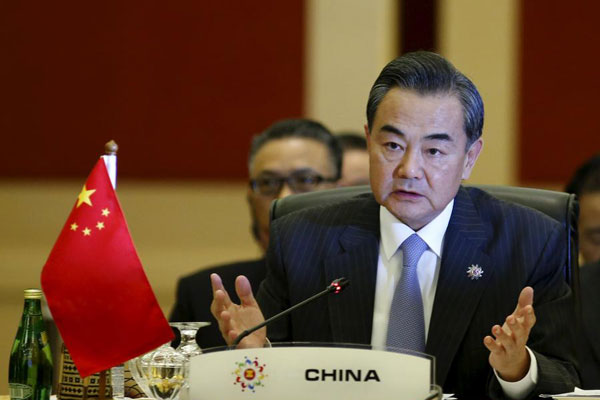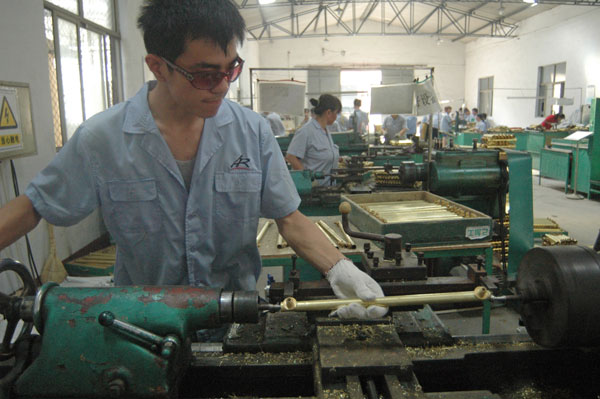China rejects Philippine, Japanese, US claims on S. China Sea issue
Updated: 2015-08-07 10:04
(Xinhua)
|
|||||||||||
 |
|
Chinese Foreign Minister Wang Yi (R front) speaks during the East Asia Summit Foreign Ministers' Meeting in Kuala Lumpur, Malaysia, on Aug 6, 2015. [Photo/Xinhua] |
"But after 1970, the Philippines illegally occupied eight islands and reefs in China's Nansha Islands through four military operations. That's how the territorial disputes arose between China and the Philippines," Wang said.
In the Ren'ai Reef, which is a constituent part of China's Nansha Islands, the Philippines illegally ran an old warship aground in May 1999 at that feature on the pretext of "technical difficulties." China has made repeated representations to the Philippines, demanding that the latter immediately tow away the vessel. The Philippines, for its part, had on numerous occasions made explicit undertaking to China to tow away the vessel grounded due to "lack of parts."
Afterwards, the Philippines told China that it would not become the first country that breaches the Declaration on the Conduct of Parties in the South China Sea (DOC).
However, Wang said, more than 15 years have passed and the ship has become rusted, the Philippines, instead of fulfilling its promise, has openly declared that it had sneaked concrete and other building materials into the ship for consolidation.
On March 14, 2014, the Philippine foreign ministry claimed in a statement that the purpose of grounding the warship was to occupy the Ren'ai Reef. The Philippines thus exposed the 15-year lie it has invented and broke its promise. It's simply short of international credibility, Wang said.
Wang also retorted the claims of the Japanese representatives that all artificial islands and reefs in the South China Sea do not produce legal rights for the owner.
"But let's see what Japan has done. In recent years, Japan has spent some 10 billion yen (about 80 million U.S. dollars) on the tiny atoll of Okinotori, building it into a de facto island with cement and steel, and then claimed a right to a continental shelf extending beyond its 200-nautical mile coast boundaries as exclusive economic zone at the United Nations.
"However, most UN members considered Japan's claim inconceivable and chose to decline the proposal.
"Therefore, Japan should review its own words and deeds before criticizing others. Unlike Japan, China has claimed its right to the South China Sea a long time ago, which does not require enhancement through land reclamation."
Wang stressed that China is a de facto victim of the South China Sea issue.
"To maintain peace and stability in the South China Sea, we have exercised great restraint."
China's basic stand is resolving relevant disputes through negotiation and consultation on the basis of respect for historical facts and international laws, including the UN Convention on the Law of the Sea.
"This stand will never change," he said.
After friendly negotiations, Wang said, China and ASEAN countries have formulated a set of mechanisms to properly handle the South China Sea issue.
One is "dual-track" approach, which indicates that relevant disputes should be addressed by countries directly concerned through friendly consultation and negotiation. This is also the stipulation of Article 4 of the DOC, to which both China and ASEAN members have made commitments. Both China and ASEAN countries have agreed to make joint efforts to maintain peace and stability in the South China Sea.
"I want to tell you that China and ASEAN are fully capable of maintaining peace in these waters," Wang said.
The second is about implementation of the DOC and consultation on formulating the Code of Conduct in the South China Sea (COC).
Wang said so far, the DOC has been carried out smoothly, while some progress has been made in the consultation on formulating the COC.
"Since the launch of the consultation less than two years ago, we have passed two consensus documents and the consultation has entered the new phase of discussing 'crucial and complex issues'. We also have agreed to launch two hotline platforms between China and ASEAN countries, which will soon be put into operation."
Thirdly, China has offered to discuss and formulate preventive measures for maritime risk control to provide a new platform for the discussion of proposals and ideas raised by relevant parties. "It can be put into practice once a consensus if reached," Wang said.
On the so-called "three halts" proposal put forward by the United States recently, Wang said it is short of feasibility.
"For example, what is the content of the halts? Proposals of different parties are inconsistent. What are the criteria of the halts? Who will set the standards? These problems actually cannot be solved."
China still welcomes constructive comments on the maintenance of peace and stability in the South China Sea; however, relevant proposals should be feasible and double standards are not allowed in particular," he added.
"As to the land reclamation in the South China Sea which some countries are concerned about, it is neither something that happened recently nor initiated by China. In other words, 'the status quo' of the South China Sea has been changing over the years," Wang said.
China began construction projects on some manned islets of the Nansha islands, he said, emphasizing that they are aimed at improving working and living conditions on those islets with strict environmental standards.
The Chinese minister informed his fellow counterparts that by the end of June, China has completed the land reclamation. The next step is to build facilities primarily used for public purposes, including lighthouse, maritime emergency rescue, weather station, marine scientific research as well as medical and first- aid buildings.
"Once the construction is completed, China is willing to open these facilities to countries in the region. As the largest coastal country in the South China Sea, China has the ability and obligation to provide these maritime public goods to countries in the region," Wang said.
He pointed out that an arbitration request over the South China Sea issue was mentioned by the Philippines at the East Asia and ARF foreign ministers' meetings in an attempt to smear China.
"I would like to respond with facts. First, to settle disputes through direct negotiations between relevant parties is the way advocated by the Charter of the United Nations and a common international practice," Wang said. "More importantly, it is also clearly stated in the Declaration on the Conduct of Parties in the South China Sea (DOC). To this end, China has proposed bilateral talks with the Philippines and this proposal is still valid. But until today, the Philippine side still refuses our proposal."
As to the proceeding of starting international arbitration, Wang said the normal practice is that a consensus should be reached first by the countries concerned.
"However, neither did the Philippines inform China in advance, nor it sought China's consent. The Philippines just unilaterally and forcefully initiated the arbitration," he said. "The Chinese side cannot understand this act, and could only think that there were ulterior motives behind this."
The Chinese minister contended that Manila should know that China has already issued a statement in 2006 that it does not accept the arbitration under the provisions of section 298 of the United Nations Convention on the Law of the Sea, which is China's legitimate right under the law.
While knowing that it is impossible for China to accept any result of arbitration, the Philippines still insisted on pushing forward the so-called arbitration in violation of the DOC and the agreement with China to settle the issue bilaterally.
"There is only one possible explanation to this, that is it intends to confront China," he said. "The Philippine people should know the truth, and the country's future should not be hijacked by a minority of people."
However, the Chinese minister stressed that the door is still open for dialogue. "I believe as long as the two sides sit down and talk seriously, there will always be a solution to the problem, " he said.
Today's Top News
State Council approves plan to overhaul SOEs, claims report
Chinese companies finding credibility abroad
Sun Yang is no-show for 1,500 free final at worlds
Measuring women's bust shows how dating is transforming
China rejects Philippine, Japanese, US claims on S. China Sea issue
MH370 passengers' families want more answers
'New Suez Canal' opened
for ship traffic
Trump won't rule out third-party run
Hot Topics
Lunar probe , China growth forecasts, Emission rules get tougher, China seen through 'colored lens', International board,
Editor's Picks

|

|

|

|

|

|






